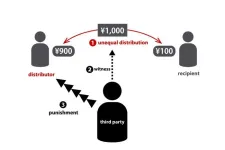(Press-News.org) More than one in three parents say their child has faced issues like tooth decay, cavities, stained teeth, gum concerns or tooth pain over the past two years, a national poll suggests.
And these problems were linked to children’s oral care routine, more commonly experienced among those who skipped dental hygiene recommendations or followed them less often, according to the University of Michigan Health C.S. Mott Children’s Hospital National Poll on Children’s Health.
“Maintaining oral health from a young age, including regular brushing and flossing, helps prevent tooth decay, gum disease and other issues that make it difficult for children to eat and speak clearly,” said Mott Poll Co-Director Sarah Clark, M.P.H.
“Over a third of parents in our poll reported their child does not regularly brush twice a day - the most basic level of oral hygiene.”
The nationally representative report is based on 1,801 responses from parents with at least one child aged 4-17 polled in August 2024.
Oral hygiene practices often neglected
Sixty-four percent of parents say their child brushes their teeth twice a day and roughly 60% say brushing lasts for at least two minutes.
But fewer parents say their child consistently follows other oral health recommendations. For example, only a third of parents report their child regularly brushes the tongue, and less than a quarter floss regularly, which helps remove hard-to-reach food remnants between the teeth.
Both the tongue and the crevices between teeth are areas that harbor bacteria that cause tooth decay, gum disease or bad breath, Clark notes.
In between brushing, rinsing the mouth with water after consuming sugary foods or beverages can help to prevent the sugar from adhering to the teeth; however, only 15% of parents report their child regularly uses this strategy.
Overall, just one in five parents say their child does at least four of the top six recommended oral health tasks on all or most days — with less consistency reported among boys than girls. Children who followed fewer practices and did them less frequently had more oral health challenges.
“Regular oral health prevents plaque buildup and keeps gums healthy by preventing inflammation, bleeding, and infection,” Clark said. “Teaching kids the importance of a comprehensive oral hygiene routine sets the foundation for lifelong oral health.”
Over a third of parents polled have also noticed that their child has bad breath, which was more common among children who only followed one or less oral hygiene practices all or most days.
Most parents attribute their child’s bad breath to “morning breath” or lack of brushing or flossing while less than a quarter cited smelly food, mouth breathing or dental problems.
“Neglecting oral health habits is not only harmful for overall health but can increase the risk of discolored teeth and bad breath, which can be embarrassing for children and cause low self-esteem,” Clark said.
To improve oral hygiene, she adds, parents need to find ways to ensure that all family members have enough time in the morning and evening while also making sure children are brushing and flossing correctly.
Dental visits essential for catching problems early
Most parents polled say their child’s most recent dentist visit was within the past year, but 7% said it was one to two years ago and 4% said it’s been more than two years. Parents reporting their child follows 0-1 oral hygiene recommendations all or most days are also more likely to say their child has not had a dental visit in over a year
The American Dental Association recommends a dental visit every six months to discover early signs of decay, monitor the growth of teeth, and educate children and families on oral hygiene, Clark says.
“Each child’s oral health needs are unique. Dentists can provide tailored recommendations; for example, some children will benefit from sealants or fluoride varnish to protect the teeth from sources of decay,” she said.
“Early detection allows for timely intervention, often reducing the need for more invasive treatments later.”
END
Over 1/3 of parents say their child has experienced dental problems that reflect oral hygiene habits
More than a third of parents say their child doesn’t regularly brush teeth twice a day, many kids don’t follow other dental recommendations like flossing
2025-01-27
ELSE PRESS RELEASES FROM THIS DATE:
Colorado’s parental notification law can impede adolescent access to abortion, study says
2025-01-27
AURORA, Colo. (Jan. 27, 2025) – A new study led by researchers from the University of Colorado Anschutz Medical Campus has shed light on the burdens parental involvement laws impose on adolescents seeking abortion care, even in states like Colorado where abortion is protected. Researchers say these laws contribute to logistical barriers, heightened stress and delays in accessing care, disproportionately impacting vulnerable populations.
The study, published today in the Journal of Adolescent Health, analyzed the experiences of adolescents (ages 15-17) and young adults (18-22) who either sought or ...
Drones could be the ‘magic tools’ we need to chase bears away from people
2025-01-27
Brown bears roam across much of the northern hemisphere from the mountains of Spain to the prairies of the US. These bears are formidable carnivores that can weigh up to 751 kg (1,656 lb) and have claws 15 cm (6 in) long. With long canine teeth and a bite force of 6,800,000 pascals (1,000 psi), these bruins can easily crush bones. All these powerful features make brown bears an imposing predator that can take down prey as large and dangerous as an adult bison. Yet, while these bears eat meat, much of their diet is plant-based because they are omnivores. Brown bears have very few dietary restrictions. They are certainly not gluten intolerant ...
Rethinking altruistic punishment: New experimental insights
2025-01-27
How would you react if someone cut in line behind you? Some people will warn others to follow the rules, even if it does not affect them. This is known as altruistic punishment, the act of punishing others for selfish behavior without reciprocal benefit.
Previous studies on altruistic punishment often placed participants in unnatural settings where they were compelled to observe the selfishness of others and decided whether to punish them. In reality, there are times when avoidance of such a situation takes precedence over confronting unfairness. In other words, a person could pretend they did ...
Move more, age well: Prescribing physical activity for older adults as a recipe for healthy aging
2025-01-27
Can physical activity extend the lifespans of older adults? A review article published in CMAJ (Canadian Medical Association Journal) https://www.cmaj.ca/lookup/doi/10.1503/cmaj.231336 summarizes the considerable evidence supporting the important role physical activity plays in preventing or reducing the effects of diseases and discusses how to prescribe effective exercise for older adults.
Canada’s population is aging, with at least 1 in 5 people aged 65 years or older in 2025, and the number of people older than age 85 years is expected to triple in the next 20 years. However, for many people, ...
Botanic Gardens must team up to save wild plants from extinction
2025-01-27
A major study of botanic gardens around the world has revealed their struggles with one fundamental aim: to safeguard the world’s most threatened plants from extinction.
Researchers analysed a century’s worth of records - from 1921 to 2021 - from fifty botanic gardens and arboreta currently growing half a million plants, to see how the world’s living plant collections have changed over time.
The results suggest that the world’s living collections have collectively reached peak capacity, and that restrictions ...
Approaching the red planet from the kitchen
2025-01-27
Niigata, Japan - Rootless cones are small volcanic landforms ranging from several to several hundred meters in diameter, formed by continuous explosions resulting from the interaction between surface lava and water bodies like lakes and rivers (Figure 1). Unlike regular volcanoes originating from magma rising from deep underground, rootless cones form when lava covers a water-containing layer, triggering explosive reactions. Due to this process, they are also called pseudocraters. While Iceland hosts many rootless cones, they ...
How Camellias evolved with the formation of the Japanese archipelago?
2025-01-27
Niigata, Japan – The distribution of plants has been shaped by geological and climatic changes over time through repeated migration, extinction, and adaptation to new environments. The genus Camellia, comprising over 100 species mainly in East Asia, is a representative warm-temperate tree of the Sino-Japanese Floristic Region.
In Japan, four species of Camellia are found, with Camellia japonica and Camellia rusticana being the most well known. C. japonica has a broad distribution from Aomori Prefecture in the cool-temperate ...
Study succeeds in the early diagnosis of leptomeningeal disease in diffuse midline gliomas by liquid biopsy
2025-01-27
Niigata, Japan – A group led by the Department of Neurosurgery, Brain Research Institute, Niigata University succeeded in the diagnosis of leptomeningeal disease in diffuse midline gliomas by detecting H3K27M-mutant droplets from circulating tumor DNA of cerebrospinal fluid taken from these patients. In two patients, leptomeningeal disease was diagnosed earlier than with traditional methods such as MRI and cerebrospinal fluid cytology. In one patient, long term survival after the diagnosis of leptomeningeal disease by early ...
Understanding the science of meaty flavors could be key to sustainable diets, says academic
2025-01-27
Understanding the science behind meaty tastes and textures could be the key for more people switch to a planet-friendly plant diet, researchers suggest.
Ole G. Mouritsen, a professor of gastrophysics, addresses the urgent need to make changes to culinary cultures where animal-based proteins play a central role.
Replicating a little-known meaty flavour and a sensation of richness could encourage more plant-based eating, he explains.
“To ensure that there is enough food for a growing world population, to lessen the burden on the environment, and to promote healthier, sustainable eating patterns, it ...
Patients who received Ross procedure demonstrate excellent survival rates after 20 years
2025-01-26
LOS ANGELES —January 26, 2024 — Young patients who have undergone the Ross procedure for aortic valve disease have shown excellent long-term survival, the majority without the need for additional surgery two decades later.
These findings, presented today at the 61st annual meeting of The Society of Thoracic Surgeons (STS), were the result of a 22-year study at the Narayana Institute of Cardiac Sciences in Bengaluru, India.
“The Ross operation can be performed safely with results comparable to mechanical valve replacement,” said the study’s lead author, cardiac surgeon ...
LAST 30 PRESS RELEASES:
SfN announces Early Career Policy Ambassadors Class of 2026
Spiritual practices strongly associated with reduced risk for hazardous alcohol and drug use
Novel vaccine protects against C. diff disease and recurrence
An “electrical” circadian clock balances growth between shoots and roots
Largest study of rare skin cancer in Mexican patients shows its more complex than previously thought
Colonists dredged away Sydney’s natural oyster reefs. Now science knows how best to restore them.
Joint and independent associations of gestational diabetes and depression with childhood obesity
Spirituality and harmful or hazardous alcohol and other drug use
New plastic material could solve energy storage challenge, researchers report
Mapping protein production in brain cells yields new insights for brain disease
Exposing a hidden anchor for HIV replication
Can Europe be climate-neutral by 2050? New monitor tracks the pace of the energy transition
Major heart attack study reveals ‘survival paradox’: Frail men at higher risk of death than women despite better treatment
Medicare patients get different stroke care depending on plan, analysis reveals
Polyploidy-induced senescence may drive aging, tissue repair, and cancer risk
Study shows that treating patients with lifestyle medicine may help reduce clinician burnout
Experimental and numerical framework for acoustic streaming prediction in mid-air phased arrays
Ancestral motif enables broad DNA binding by NIN, a master regulator of rhizobial symbiosis
Macrophage immune cells need constant reminders to retain memories of prior infections
Ultra-endurance running may accelerate aging and breakdown of red blood cells
Ancient mind-body practice proven to lower blood pressure in clinical trial
SwRI to create advanced Product Lifecycle Management system for the Air Force
Natural selection operates on multiple levels, comprehensive review of scientific studies shows
Developing a national research program on liquid metals for fusion
AI-powered ECG could help guide lifelong heart monitoring for patients with repaired tetralogy of fallot
Global shark bites return to average in 2025, with a smaller proportion in the United States
Millions are unaware of heart risks that don’t start in the heart
What freezing plants in blocks of ice can tell us about the future of Svalbard’s plant communities
A new vascularized tissueoid-on-a-chip model for liver regeneration and transplant rejection
Augmented reality menus may help restaurants attract more customers, improve brand perceptions
[Press-News.org] Over 1/3 of parents say their child has experienced dental problems that reflect oral hygiene habitsMore than a third of parents say their child doesn’t regularly brush teeth twice a day, many kids don’t follow other dental recommendations like flossing





